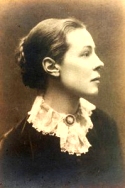The Power of Focus: The Story of Lilias Trotter

Either choice would have been a good one.
Lilias Trotter was a gifted artist. So gifted, in fact, that one of the premier art critics of 19th century Europe, John Ruskin, said that if she would devote herself to art, “she would be the greatest living painter and do things that would be immortal.”
Lilias was born in England in 1853 to a wealthy Christian family. Both her parents had an acute love of beauty, and they shared their passion with their children. The family enjoyed outings in the country where they gathered ferns and berries. They took an extended trip every year, and delighted in viewing the scenery from the windows of the stage coach. Lilias wept with joy over the beauty of the Swiss Alps the first time she saw them. She captured everything in her sketchbook.
Lilias’ father died when she was twelve years old. Though she had been a believer before this tragedy, the loss of her father softened and spiritually deepened Lilias. She learned to run to her Heavenly Father in times of difficulty, and developed a close walk with God.
In her twenties, Lilias divided her time between her two great loves, working with the poor in the London slums and honing her skills as an artist. But Ruskin, who had taken Lilias under his wing as a student, forced her to choose. He felt that in order to be truly great, her whole energy needed to be focused on her art. Lilias had a decision to make.
Lilias prayed and asked for counsel from her friends. Finally she decided that she agreed with Ruskin. That is, she agreed that she needed to be fully focused on one passion. Later in life she would write:
Satan knows well the power of concentration; if a soul is likely to get under the sway of the inspiration, “this one thing I do,” he will turn all his energies to bring in side-interests that will shatter the gathering intensity.
And they lie all around, these interests. Never has it been so easy to live in half a dozen good harmless worlds at once—art, music, social science, games, motoring, the following of some profession, and so on. And between them we run the risk of drifting about, the “good” hiding the “best” even more effectually than it could be hidden by downright frivolity with its smothered heart-ache at its own emptiness.
And for her, the decision was clear. Lilias felt she could not give herself to painting in the way Ruskin asked and still seek first the Kingdom of God. With great pain and great joy, she chose to focus her life on evangelism. Even though it was what she really wanted, letting go one dream to pursue another still felt like a loss.
Lilias recovered quickly and set off to serve God with a newly focused passion. She applied to the North Africa Mission to serve in Algeria, but was denied because of her poor health. Lilias and a friend went to Algeria anyway, as self-supported workers. They would found the Algiers Mission Band, which would later become Arab World Ministries. Lilias wrote tracts in Arabic and illustrated them, drawing much of her inspiration from nature and the beauty of that desert region.
Lilias and her friend Blanche lived among the people in a crowded city. Over the years, they tried many different programs to gain a foothold to teach about Christ. They taught classes on sewing and on the Bible. They traveled far across the desert to reach small villages with the good news and they opened their home to people in need. It was very hard to disciple converts in a land saturated in Islam, and they routinely worked themselves into exhaustion.
After her death in 1928, people were asked what they remembered about Lilias Trotter. For most, it was her great love for individuals she encountered and her investment in their souls. Scores of people have come to know Christ either directly or indirectly because of Lilias’ willingness to focus on the best, even at the loss of something good. Like Mary listening at the feet of Jesus, she chose the better part.

